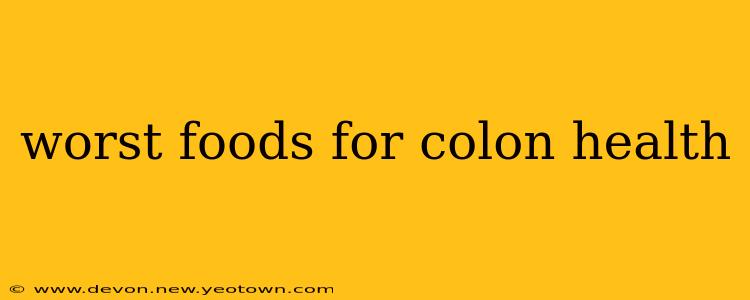The Worst Foods for Your Colon: A Gut-Wrenching Story
Our digestive system, particularly our colon, is a complex and fascinating ecosystem. It's a bustling city of beneficial bacteria working tirelessly to keep us healthy. But just like any city, it's vulnerable to disruptions. Certain foods, acting like unwelcome invaders, can wreak havoc on this delicate balance, leading to discomfort, inflammation, and even long-term health issues. Let's embark on a journey to uncover the worst offenders—the foods that can seriously compromise your colon health.
This isn't about strict dieting; it's about making informed choices to support your gut's well-being. We'll explore the culprits and understand why they're problematic, empowering you to make better decisions for your long-term health.
Highly Processed Foods: The Urban Blight
Imagine your colon as a pristine city street. Now picture trucks dumping mountains of garbage—that's what highly processed foods do. These foods, packed with artificial ingredients, preservatives, and excessive amounts of unhealthy fats and sugars, overwhelm your digestive system. They lack the fiber needed for healthy bowel movements, leading to constipation and potentially increasing your risk of colon cancer. Think of those alluring, brightly packaged snacks and ready-made meals—they often represent the urban blight of your gut.
Red and Processed Meats: The Industrial Pollution
Red meat, particularly processed meats like hot dogs, bacon, and sausages, has long been linked to increased risk of colon cancer. Studies suggest that certain compounds formed during the cooking process, along with high saturated fat content, promote inflammation and damage to the colon lining. While the occasional steak isn't likely to cause catastrophic damage, excessive consumption is a concern. Think of this as industrial pollution slowly poisoning your city.
Foods High in Saturated and Trans Fats: The Toxic Waste
Saturated and trans fats, often found in fried foods, baked goods, and processed snacks, are like toxic waste dumped into your colon's ecosystem. These fats contribute to inflammation, disrupt the gut microbiome, and increase the risk of various health problems, including colon cancer. Limiting these culprits is crucial for maintaining a healthy gut.
Refined Grains: The Crumbling Infrastructure
Refined grains, like white bread and white rice, are stripped of their fiber during processing. Fiber is essential for healthy digestion; it acts like the strong infrastructure holding your city together. Without adequate fiber, waste sits longer in the colon, leading to constipation and increased risk of colon polyps, which can sometimes become cancerous.
Artificial Sweeteners: The Unnatural Disaster
Artificial sweeteners, while marketed as healthier alternatives, may disrupt the gut microbiome, possibly leading to negative effects on digestion and overall colon health. More research is needed, but current understanding suggests these are something to consume sparingly, if at all. They are the unnatural disaster in your gut's landscape.
What About Sugar? The Sweet Poison
Excessive sugar intake feeds bad bacteria in the gut, disrupting the delicate balance and leading to inflammation. While a little sugar is fine, sugary drinks and processed foods containing high levels of added sugar should be consumed sparingly.
Alcohol: The Social Hazard
Moderate alcohol consumption may not be catastrophic, but excessive drinking can irritate the colon lining and increase inflammation. Think of it as a social hazard – occasionally acceptable but dangerous in excess.
How Much Fiber Do I Need?
The recommended daily fiber intake varies depending on age and sex, but generally aim for 25-30 grams of fiber per day.
What are the Signs of Poor Colon Health?
Changes in bowel habits (constipation, diarrhea), abdominal pain, blood in stool, and unexplained weight loss warrant medical attention.
What can I do to improve my colon health?
Focus on a diet rich in fruits, vegetables, and whole grains. Stay hydrated and engage in regular physical activity. Consult your doctor for personalized recommendations.
By making conscious food choices and understanding the potential negative effects of certain foods on our colons, we can contribute to a healthier and more harmonious inner city. Remember, this is not about eliminating joy from your diet, but about making informed choices that promote long-term well-being.

